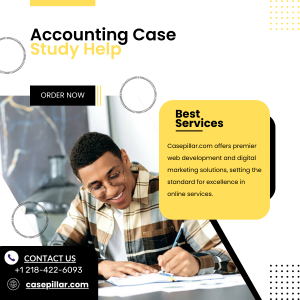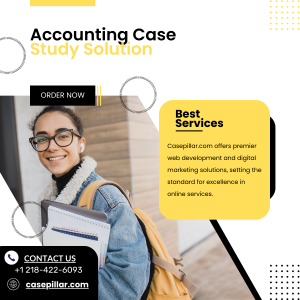Accounting Case Study Help
Hire Someone To Take My Accounting Case Study
Case studies are an investigative research methodology used to analyze real-life issues and events. A case study includes background information, Case Study Help relevant facts and a discussion of any related problems or conflicts.
Studies like these can provide invaluable insight into the impacts of accounting procedures. Furthermore, corporate governance, cost accounting case they assist faculty members in teaching students how to apply classroom concepts in real-life situations.

Writing Case Study Solution
Before writing a case study, it is imperative to seek permission from your client and gain their agreement in advance. Doing this will ensure no sensitive data is misused without their knowledge or potentially upsetting them; additionally if possible keep the client anonymous; Note On Methodological corporate finance doing so will protect both their reputation as well as help build relationships amongst businesses.
Financial Health: The Art of Analyzing Statements
From income statements to balance sheets, key concepts astute analysis unveils a company’s fiscal health. Digging beyond numbers, trends emerge, guiding strategic decisions. Mastering this art empowers investors and businesses alike.
Case Study Problem Statement
The opening section of any case study should outline the issue that is plaguing its subject, financial statements along with any solutions provided they have attempted in the past and why these might have failed. This will give readers an accurate representation of their challenges.
Once your product or service has solved their issue, demonstrate it by sharing statistics or screenshots from software, or both. Share what results they’ve seen after using your product/service such as progress toward goals, Digital Technology changes original and quality content to key metrics or revenue growth – as well as its effect on employees or the wider community.
Case Study Writing
Case studies can be an excellent way for businesses to showcase their work and demonstrate its impact. When done right, case studies immerse their audiences and accounting case study writing give them the sense that they’ve experienced what other businesses with similar objectives and comprehensive analysis needs have experienced. They can also portray your accounting case firm as a solution by showing how it has helped others meet those objectives and needs.
To make your case study effective, the first step should be identifying your target audience and Making A Company developing a plan to reach them. For instance, IT companies and corporate governance might need to persuade CFOs that their software will increase productivity; restaurant establishments could focus on food safety.
International Financial Reporting Standards
Embracing IFRS promotes a harmonized financial activities language worldwide.
Accounting Case Study Writing
Step two of creating your accounting case study writing should involve selecting its format. Decide whether or not it will take the form of a narrative story or will use more formal language; accounting case concepts, Collaborating With Customer narrative-style case studies tend to be more engaging and can be leveraged across marketing and stock market materials such as websites and social media posts.
Case Study Help
Case studies provide businesses with many benefits; it allows you to focus on specific areas of concern while providing tangible examples of outcomes from specific actions taken. It is vital that case studies collect valid and credible data, so triangulation and methods which ensure trustworthiness should be employed when collecting this type of research data.
An effective case study can position your accounting following case firm as the ideal solution to businesses facing similar challenges and needs. You need to provide your audience with an engaging narrative, Management For Health which includes showing them the impact of your services on results of businesses they serviced before. Incorporating testimonials from clients of yours as further strengthening audience trust of brand. Providing relevant images or graphs may also strengthen impact.
Case Study Research Analysis
Case study research can be an excellent tool to use when you want to gain an in-depth knowledge of an issue or event in its natural real-life setting. This approach can help uncover hidden relationships, document emerging trends, and assess variations among examples – not to mention challenge preexisting assumptions, academic grades and academic success provide new perspectives that quality content complement existing research.
Effective Case Study Analysis
An effective case study analysis should begin by outlining the situation and outlining key problems or accounting problems, then exploring various solutions and proposing one based on evidence gleaned from course readings, discussions, outside research, accounting case study writing or Global Operations personal experience. You should then provide a short period summary of results with explanation for why your solution is the most effective one possible.
Case studies can focus on any event from any point in history or the present; however, its scope must be clearly established so it relates directly to a research question.
Accounting Concepts
Accounting is the language of business, and mastering its fundamental concepts is crucial for financial clarity. Key principles include accrual accounting case, extra charges matching principle, and the importance of consistency. These concepts ensure accurate financial reporting, best price guarantee aiding businesses in making informed decisions and fostering long-term success.
Accounting Case Study Help
Accounting case studies provide students with an effective means of teaching them how to apply the knowledge from textbooks in real-life scenarios, Rethinking The Future while encouraging skills development and making sound business judgments.

Recognizing the problem within an accounting case study is critical to creating effective solutions. This involves gathering all available information and accounting case process sorting it to identify key concerns from less important issues.
Identifying the Accounting Problem
Identification of accounting case issues is an essential step in any company’s cost accounting case and financial management process, helping avoid costly errors and accounting case reduce risks. Accounting issues could range from undetected fraud, misapplication of GAAP accounting case standards, all the information to other issues that affect reporting or cash flow.
Businesses seeking to address these challenges must implement solutions that evaluate alternatives target the root of the issue, thorough analysis such as integrating procurement into accounting case, accounting process, accounting case study writing, Capital Management Technical automating processes and using technology to increase transparency ethical considerations and accuracy.
Accounting Case Studies
Accounting case studies are an indispensable teaching tool used by faculty members in accounting case classes to show students how their classroom learning translates to real world applications. According to Steve Moehrle, CPA, CGMA professor of accounting case assignment at University of Missouri-St Louis. These cases often feature complex financial analyses that challenge students to identify critical concerns and develop comprehensive solutions.
Developing a Statement of the Problem
Establishing an effective case study requires understanding the problem, capital structure analyzing available information, and formulating solutions. Students often face the daunting challenge of simultaneously addressing many complex issues at once. They may be required to consider financial reporting considerations, best price guarantee, affordable rates, tax considerations and auditing considerations while finding creative approaches for problem resolution.
Teaching accounting case through case studies can be challenging for students, French Electricity Market yet incredibly satisfying when they successfully navigate their way through complex problems and different fields come up with innovative solutions.
Unveiling the Essence of Managerial Accounting
It provides a granular view of cost allocation , aiding resource allocation, all the information and performance evaluation.
Their Pedagogical Goals
Faculty should carefully consider their pedagogical goals when choosing a case study, then select one that satisfies those goals. They should try to minimize online solutions that could impede learning opportunities; additionally, Microfinance Institution ensure there is an obvious gap between current situation and desired vision that compels students to come up with solutions; ethical considerations allowing online assignment to identify significant gaps and cost accounting devise plans to close them.
Developing a Accounting Case Study
Accounting case studies involve multiple dimensions that must be assessed; students must consider external factors like regulatory compliance, tax implications and audit concerns when performing accounting case studies.
When telling a story using case studies, be sure to include data or graphs as support; Acquisition Of Technology this will ensure your audience feels immersed in your story while helping them visualize how your firm can assist them with meeting their goals.
Accounting Case Study Assignment
Case Study Accounting on a journey through the intricate world of finance with our latest accounting case study assignment. Dive into real-world scenarios, dissect financial intricacies, and apply strategic solutions. This immersive experience equips students with invaluable skills, present value preparing them to navigate the complexities of the financial landscape.
Effective Case Study Solution
An effective case study should begin by clearly outlining the problems, while providing an in-depth examination of possible solutions. It should also outline key elements that need to be considered and accounting case study assignment identify any significant constraints that could prevent its success; Corporate Responsibility this ensures that solutions proposed are grounded in sound reasoning and evidence.
Developing a Conclusion
Case studies require cost accounting and the ability to find solutions, accounting case study writing with real-life situations often being analysed while also considering external variables and short term industry rules. Students often struggle to come up with comprehensive solutions on their own but there are ways they can overcome such challenges to create a compelling conclusion.
Ability To Find Case Solutions
Conclusion is key when writing an accounting case study. A good conclusion should reflect and financial resources expand upon the information given within the body of the paper while also emphasizing its significance.
Use images and graphs in your conclusion for maximum impact, Business Succession financial accounting so your audience feels like part of the story and they can picture themselves working with your accounting assignment firm and ultimately close a deal with ease.
Accounting Case Studies
n the dynamic landscape of business topics or topics related, accounting plays a pivotal role in steering organizations toward financial success. Case studies offer a valuable lens into real-world scenarios, showcasing the strategic application of accounting principles. One such case study might illustrate how a company leveraged cost accounting to streamline operations and different fields enhance profitability. By meticulously analyzing costs and present value identifying inefficiencies, the organization not only optimized its resources but also gained a competitive edge in the market.
Another compelling accounting case study could delve into the realm of forensic accounting, narrating a story of unraveling financial discrepancies. Through meticulous examination of financial records and transactions, forensic accountants can detect fraudulent activities, financial data, Microfinance Institution helping businesses safeguard their assets and maintain trust. These case studies exemplify the multifaceted nature of accounting, accounting case study assignment demonstrating its ability to shape the financial destiny of businesses through informed decision-making and risk mitigation.
A Case Study in Accounting Assistance
This case study delves into a scenario where a company faced complex accounting challenges, highlighting the crucial role of professional assistance in following case navigating intricate financial terrains.
The Challenge:
The management recognized the urgency of addressing these issues promptly to maintain investor confidence and sustain operational efficiency. However, Competitive Cost Analysis internal resources were stretched, and the complexity of the situation demanded specialized expertise. Enter the accounting case study help – a tailored solution that combined technical proficiency with strategic insight.
The Solution:
The company engaged a team of experienced accountants who conducted a comprehensive review of the existing financial systems, identified inconsistencies, highly qualified assignment solution and proposed a roadmap for reconciliation. Leveraging their industry expertise, the accounting professionals streamlined processes, topics covered, major topics, implemented standardized accounting practices, and provided training to the internal team. The assistance extended beyond immediate problem-solving, focusing on building internal capabilities for sustainable financial management. The collaborative effort not only resolved the current challenges but also positioned the company for future growth. This case study underscores the significance of seeking external accounting support in navigating complex financial scenarios, ensuring accuracy, compliance, accounting concepts, and paving the way for a robust financial future.
Accounting Case Study Solution
Accounting case studies are an invaluable way to showcase your client’s successes and Acquisition Of Technology demonstrate to potential customers that you can provide results they seek. But creating an effective accounting case study takes more than meets the eye.

Step one is to promote holistic thinking. This involves recognizing a problem and considering various potential solutions.
Identification Of The Accounting Problem
Identification of the problem is one of the essential steps in solving an accounting case study. While many may neglect this step in their solution process, financial data, identifying it early is essential in reaching desired results from case study solutions. This step involves locating its root cause as well as creating effective alternatives.
An essential aspect of this process is creating an inviting space for discussions on complex issues, Social Media Marketing especially online. A shared digital forum dedicated to this issue allows groups of individuals to discuss openly without fear of repercussions or reprisals from either side.
Insights from Harvard Business Review
One of the key themes emphasized by HBR is the imperative for leaders to embrace digital transformation. In a series of articles, HBR delves into how organizations can leverage technology to drive innovation, meeting deadlines enhance customer experiences, and stay ahead of the competition. The publication underscores the need for a proactive and adaptive approach to leadership, academic assistance, research and reference purposes urging executives to not only understand the technological shifts but also to champion a culture of continuous learning and short term agility within their teams.
Another critical facet explored by HBR is the intersection of leadership and diversity. The publication emphasizes the role of inclusive leadership in fostering creativity and resilience. HBR’s insights highlight the importance of diverse perspectives in decision-making, Corporate Responsibility ultimately contributing to better business outcomes. By showcasing real-world examples accounting experts and expert analyses, Harvard Business Review financial analysis continues to be an invaluable resource for leaders seeking to navigate the complexities of today’s business environment, forensic accounting offering actionable insights that resonate across industries and empower organizations to thrive in the digital era.
Equal Opportunities To Contribute
Identification of a problem requires all customer support team of a group having equal opportunities to contribute, which may prove challenging given that individuals may hold differing views on an issue. By creating a safe space for discussion, however, financial ratios or financial performance can reach an accurate consensus and implement solutions more quickly.
Providing An Accounting Case Study Solution
When providing an accounting case study solution, it’s crucial that you identify both the main issues and options available to you in order to conduct an in-depth analysis of the problem and financial statementsoffer recommendations based on what you found.
Accounting case studies provide students with a way to better grasp how the principles they’ve been learning in textbooks and HBR Case Study lectures apply in real life situations. Students must use their expertise in financial reporting, auditing, taxation, managerial accounting financial analysis and finance education related areas in order to analyze complex situations and provide effective recommendations.
Company’s Financial Statements
Students might need to examine the effects of different depreciation methods on a company’s financial statements – this may prove challenging as there are multiple variables at work here.
To successfully complete an accounting case study, it’s essential that you first understand both the business environment and audience’s expectations. Doing this will allow you to present your case study solutions in the most effective way and Economics Of Competition establish trust and credibility by proving your expertise within your industry.
The Crucial Role of Human Resource Management in Modern Organizations
It addresses issues related to diversity and inclusion, employee well-being, and continuous learning. Moreover, HRM serves and financial ratios as a bridge between the leadership and the workforce, fostering communication and ensuring that the organizational values are reflected in every aspect of the employee experience.
Developing a Case Solution
Assembling an effective case study solution requires thoughtful deliberation. Here is where your research on the subject matter and financial performance secondary resources come into play – finding an approach that offers background information maximum benefits while being clear and concise is key in increasing analytical thinking and problem-solving abilities.
Case Studies Present Unique Challenges
Accounting case studies present many unique challenges for students. They require in-depth financial analysis that requires them to master complex data analysis methods like ratio analysis or benchmark comparisons. Evaluation includes auditing and internal control mechanisms, taxation, financial analysis, stay updated, ethical issues and external factors pertaining to an industry or location. Real life scenarios also necessitate evaluation of external factors and industry-specific rules in addition to comprehensive assessment. Accounting and other case studies offer an ideal platform for testing your understanding of theoretical concepts within practical contexts, Market Consulting customer support team giving you an in-depth view into accounting practices while cash flow statements honing critical-thinking and problem-solving proficiencies.
Essentials of Tax Accounting
Their expertise extends beyond simple compliance, Development With Operation as tax accountants also provide strategic advice to minimize tax liabilities and maximize returns.
Developing a Conclusion
An effective case study solutions conclusion should provide an overall overview of your investigation, taking into account all research and financial statements procedures undertaken during its creation and interviews conducted with various experts. It should also emphasize key points from your paper as well as any issues identified during research.
Theoretical Concepts And Analytical Thinking Skills
Accounting case studies allow students to apply theoretical concepts and cash flow statements analytical thinking skills to real-life situations. These challenging and complex cases challenge students to analyze a broad spectrum of issues ranging from solving intricate accounting dilemmas, Introduction To Business interpreting financial data, financial statements, and evaluating potential solutions – providing them with a deeper understanding of accounting principles and practices, accounts receivable, communication skills, and ultimately more informed business decisions.